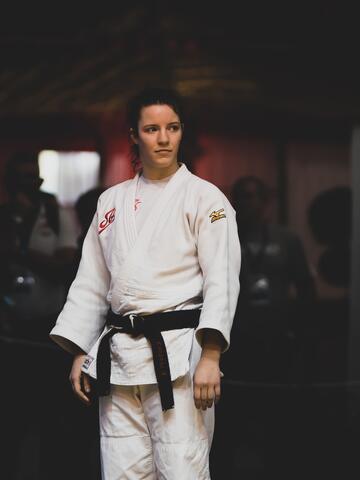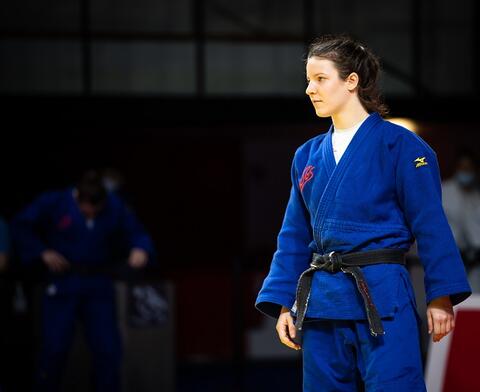
Aurore Cabanne
Student of Russian and top-level sportswoman
I compete in an average of one competition every fortnight, sometimes every week, and often abroad.
Aurore Cabanne is a second-year student of Russian at the Faculty of Arts and Humanities. Judo, boxing, wrestling, sambo, jujitsu... she never lets her guard down and combines her studies, her commitment to the French Army and top-level sport.
How did your passion for your different sports come about?
I wasn't even 3 years old when I started judo at my grandfather's club. It ran in the family - my father and uncles also started very early, and my parents met on the mat. So my path seemed clear!
Why did you choose to pursue a high-level career in several sports?
I play five sports: judo, wrestling, jujitsu newaza (floor judo), beach wrestling and sambo - a combat sport created in the USSR in the 1930s, combining judo, boxing and wrestling.
Having started judo at a young age, practising at the top level came naturally over the years. Then I discovered sambo as a teenager. I was looking to train more, and I discovered a club in my village that happens to be one of the biggest sambo clubs in France. As I was loving these two disciplines, I wanted to try wrestling, which is a fairly similar combat sport. I knew a very good trainer near me, so I went to train with him and ended up as French champion in my first appearance at the French championships. For the last two years, sambo has been going through a difficult period both nationally and internationally, so I took a step back.
As far as jujitsu newaza is concerned, I started when one of my friends, who was world champion in the discipline, went to the selection rounds for the French championships. I enjoyed it, so I went with her and finished second in the French championships. As it's a discipline I enjoy, I try to stick with it.
As for beach wrestling, it was the French selectors who spotted me and suggested I come along, given my track record in other disciplines, and I found the concept innovative and interesting. The first few tournaments were productive so I kept going. Now ranked sixth in the world, I qualified for the World Beach Games in Bali in August 2023.
What are you currently studying?
After my travels abroad, I found Slavic culture interesting and wanted to study it through a degree in Russian at Sorbonne University, where I'm currently in my second year. My career plans are a bit vague at the moment because I've got a lot on my plate, both in terms of sport and my studies. I'm making progress by trying to do my best in each discipline and I think that interesting opportunities will come up in the future.
How do you manage to reconcile your studies with top-level sport?
It is not easy to fit everything into my schedule! Some competitions or sports training courses run over into the week, making it tricky to organise things. On average, I take part in a competition (often abroad) every fortnight, and sometimes even every week. Imagine how much I have to organise, with lessons, work to do at home and various training sessions! I also teach a few sambo classes and work as a community manager for a number of companies, because while some sports pay, mine don't. So I've got a lot of work to do!
No two weeks are the same. Some weeks I'm abroad, others I'm at school every day. As major competitions approach, training takes precedence over studying. For example, this week I had a world tournament near Marseille. I left on Tuesday, weighed myself on Wednesday, fought on Thursday and Friday and returned on Saturday.
How is Sorbonne University supporting you in this project?
The university is paying for my travel to the French and European judo championships, and I'd like to thank them for that, as I would otherwise have had to pay for the whole trip myself. What's more, the teachers are very understanding and allow me to catch up on homework according to my timetable.
At the same time, you are a reservist in the French Army, with the 48th Signal Regiment in Agen. Why make such a commitment, and how do you combine it with your studies and top-level sport?
My commitment to the army is something I had imagined a few years ago. I needed to give things meaning and I feel like my commitment has done that. It has also enabled me to organise myself better on a general level, although it’s strange that an additional activity has allowed me to optimise my day-to-day management. In the Army I've found people who are very committed and proud of what they do and represent, and I'm happy to be a part of that group.
You'll be taking part in the European University Championships - EUSA (European Sport University Association) in Zagreb in July. How are you preparing?
I try to train as hard as I can while staying in my weight category (-57Kg). I take part in preparatory competitions and train every day as best I can according to my schedule.
What is your most vivid memory of a competition?
There are many memories, although the most memorable was the 2021 semi-final of the French judo team championships in Perpignan, where I won the decisive bout that qualified my team for the final and secured them a medal.

Aurore Cabanne © Laeticia Cabanne
